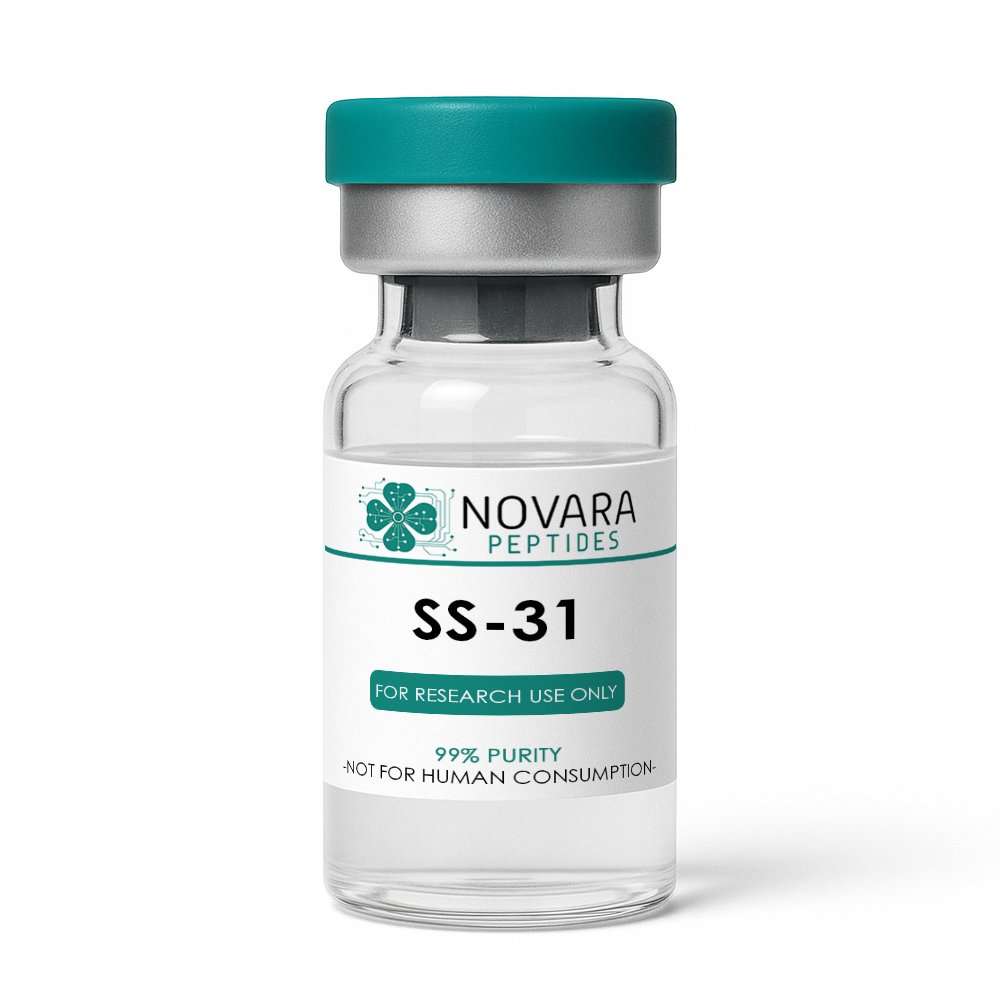SS-31
$ 45.00 – $ 175.00Price range: $ 45.00 through $ 175.00
All products are for laboratory research purposes only. Not for human consumption, medical, or veterinary use. Novara Peptides does not condone or support the use of peptides outside of controlled scientific research. By purchasing, you acknowledge that you are a qualified researcher or institution. You must be 21 or older.




SS-31 (Elamipretide)
Research-Grade Mitochondria-Targeted Peptide
Tagline: Mitochondrial Function & Oxidative Stress Research
Product Description
SS-31 (also known as Elamipretide or MTP-131) is a cell-permeable tetrapeptide that selectively targets the inner mitochondrial membrane, where it binds to cardiolipin and stabilizes mitochondrial cristae structure.
Researchers use SS-31 to study mitochondrial dysfunction, ATP production, oxidative stress, and cell survival pathways in models of cardiovascular, neurodegenerative, and metabolic disease. Its unique targeting ability makes it a powerful tool for investigating mitochondrial health and bioenergetics.
For Laboratory and Scientific Research Use Only. Not for Human Consumption.
Why Researchers Choose SS-31
Mitochondria-Targeted: Specifically binds cardiolipin in the inner mitochondrial membrane.
Improves Bioenergetics: Increases electron transport efficiency and ATP generation in models.
Reduces Oxidative Stress: Lowers ROS production and mitochondrial lipid peroxidation.
Cytoprotective Effects: Shown to improve cell survival under oxidative stress conditions.
Batch Verified: Each lot confirmed for purity (≥98%) and activity.
Important Note
For laboratory and scientific research only. Not for human consumption, veterinary use, or diagnostic purposes.
| Chemical Formula | C₃₂H₄₄N₆O₈ |
| Molecular Mass | ~639.7 Da |
| CAS Number | 1270606-37-1 |
| Form | Lyophilized peptide powder |
| Shelf Life | 24 months (lyophilized) |
| Intended Use | For preclinical and in vitro research only |
| Storage | -20 °C (dry powder), -80 °C (after reconstitution) |
Research Applications
Mitochondrial Dysfunction Studies
SS-31 improves mitochondrial membrane potential, reduces ROS generation, and restores normal bioenergetics in disease models [1].
Cardioprotection & Ischemia Research
Demonstrated to reduce myocardial infarct size and improve cardiac output in ischemia-reperfusion models [2].
Neurodegeneration & Aging
Studied for its ability to protect neurons from oxidative stress and preserve mitochondrial morphology in models of neurodegenerative disease [3].
Metabolic & Renal Research
Shown to improve kidney function, reduce fibrosis, and enhance energy metabolism in preclinical studies [4].
References
Szeto HH et al. (2014). Mitochondria-Targeted Peptide SS-31 Restores Bioenergetics. J Am Soc Nephrol.
Kloner RA et al. (2012). Cardioprotective Effects of SS-31 in Ischemia-Reperfusion Injury. Cardiovasc Drugs Ther.
Zhao K et al. (2004). Cell-Permeable Peptide Antioxidants Targeting Mitochondria. J Biol Chem.
Birk AV et al. (2013). SS-31 Improves Renal Function and Reduces Fibrosis. Kidney Int.
Mechanism of Action (How SS-31 Works)
Cardiolipin Binding: SS-31 selectively binds to cardiolipin in the inner mitochondrial membrane, stabilizing cristae structure [Zhao 2004].
Enhanced Electron Transport: Improves efficiency of Complex I and IV activity, increasing ATP production [Szeto 2014].
Reduction of ROS: Decreases mitochondrial reactive oxygen species formation and lipid peroxidation [Birk 2013].
Anti-Apoptotic Effects: Preserves mitochondrial membrane potential, reducing cytochrome c release and apoptosis [Zhao 2004].
Cytoprotection: Improves overall cell viability under oxidative stress conditions [Kloner 2012].
References
Zhao K et al. (2004). Cell-Permeable Peptide Antioxidants Targeting Mitochondria. J Biol Chem.
Szeto HH et al. (2014). SS-31 Restores Mitochondrial Function. J Am Soc Nephrol.
Birk AV et al. (2013). SS-31 Reduces Renal Oxidative Stress and Fibrosis. Kidney Int.
Kloner RA et al. (2012). Cardioprotection via Mitochondrial Stabilization. Cardiovasc Drugs Ther.


Related products
DSIP
$ 29.00 – $ 65.00Price range: $ 29.00 through $ 65.00 Select options This product has multiple variants. The options may be chosen on the product pageBPC157+TB500
$ 55.00 – $ 79.00Price range: $ 55.00 through $ 79.00 Select options This product has multiple variants. The options may be chosen on the product page






